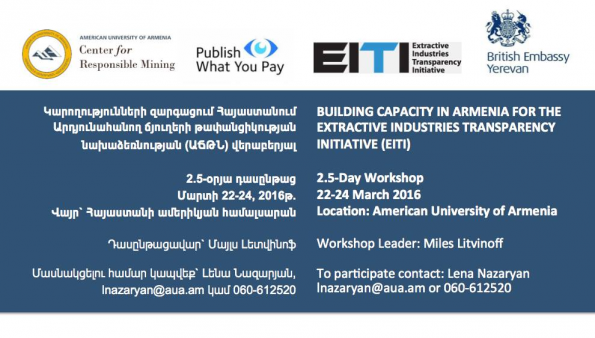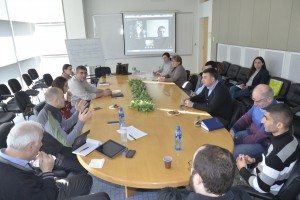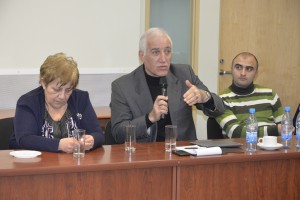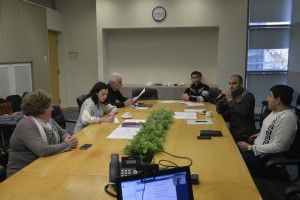About EITI | EITI Armenia and AUA Center for Responsible Mining | CSO Activities on EITI in Armenia | Workshops | Resources | EITI in Media
ABOUT EITI
The Extractive Industries Transparency
EITI Armenia and AUA Center for Responsible Mining
The AUA Center for Responsible Mining is the implementing partner of the “Support to Enhance Armenia’s Capacity to Implement Extractive Industries Transparency Initiative (EITI) and to Increase Transparency and Accountability in Mining Licenses and Contracts,” funded by the British Embassy Yerevan.
Through this project, the AUA Center for Responsible Mining is supporting the Government of Armenia by:
- Preparing the Scoping Study that will guide Armenia’s EITI Multi-stakeholder group (MSG) to specify the scope, types and volume of information to be published under the EITI and the most suitable approach for publishing it.
- Preparing a report on legal and institutional framework for the mining sector. The report will examine the legislative and institutional framework of the sector, reveal the existing gaps and propose action plan for addressing them. In particular, regulatory framework, specifications of awarding mining permits, licenses and contracts, as well as issues relating to the disclosure of beneficial owners of mining companies will be studied. In addition, a preliminary roadmap for responsible mining shall be proposed.
- Organize training sessions for journalists, related CSOs and government staff on EITI and on transparency and accountability in awarding of mining permits, licenses and contracts.
Armenia became an EITI candidate country on March 9, 2017. To become a full member, Armenia will need to meet the requirements of the EITI Standard including publishing its first EITI Report by end of September 2018.
For project launch news coverage visit:
For more information please visit http://www.gov.am/en/eiti
CSO Activities on EITI in Armenia
|
|
|
|
|
|
| The representatives of non-governmental organizations, educational and scientific institutions and individuals are discussing issues related to the roles, participation and civil society’s expectations of joining EITI. | |
WORKSHOPS
A 3-day Workshop on Building Capacity in Armenia for the Extractive Industries Transparency Initiative (EITI)
Yerevan – British Embassy Yerevan and the AUA Center for Responsible Mining jointly organized a 3-day workshop on the Extractive Industries Transparency Initiative (EITI), a global standard to promote open and accountable management of natural resources that the Government of Armenia declared in summer 2015 that it wants to join.
British Embassy Yerevan financed the visit of a leading expert on the EITI process, Mr. Miles Litvinoff, coordinator of UK EITI Civil Society Network and the Publish What You Pay UK Initiative. In addition, Mr. Litvinoff is a civil-society representative on UK’s Multi-Stakeholder Group (MSG). MSGs are the governing bodies of the EITI process in each country and have representatives from government, industry, and civil society.
The workshop, attended by 25 civil society, industry and government representatives, was intended to offer support that will help Armenia in its current efforts to join EITI. The workshop enabled participants to learn from international experience and identify international peer networks that could support the stakeholder groups by sharing of information and experience.
“The British Embassy is committed to supporting economic reform in Armenia and an improved business climate and increased investor confidence through flagship British initiatives such as Open Government Partnership (OGP) and Extractive Industries Transparency Initiative (EITI),” says Artashes Davtyan, British Embassy Yerevan’s Trade and Prosperity Officer. “As part of our contribution, the British Embassy in Armenia invited Miles Litvinoff, an expert with more than 20 years of experience in the UK and international NGO/non-profit sector, to participate and inform Armenia’s civil society organizations about his experience with EITI,” says Mr. Davtyan.
The open and interactive workshop covered a wide variety of topics including the origins and recent developments in EITI globally. Starting in 2016, for instance, all EITI member countries have to work toward implementing declaration of beneficial ownership, that is, the names of physical persons who ultimately financially benefit from the extractive companies operating in the country. Member countries have to accomplish this reporting by 2020.
The workshop also focused on the detail workings of the MSG and the decision-making rules governing the MSG. The group, esp. in the afternoon session where only civil-society members participated, focused on the Civil Society Protocol, an integral part of the EITI Standard 2016. The Civil Society Protocol outlines the role, rights and responsibilities of civil society. The participants also reviewed the details of the UK EITI action plan and the specific ways in which it is being implemented.
The detailed agenda of the workshop with useful links to documents and resources are available here. Videotapes of all the sessions are available at the AUA Acopian Center for Environment’s YouTube Channel or by clicking here.
The focus of EITI in Armenia, for the near future, will be the metal mining industry. Countries could include a variety of other extractive sectors in their EITI reporting. Additional sectors could be underground water, forests, fisheries, and, of course, oil and gas. One country, the Philippines, has also included hydropower generation.
“Now that the Government of Armenia has declared its intent to join EITI, the country needs to form its MSG. This MSG will then convene and develop an action plan. These three elements, namely Government declaration, MSG formation, and adoption of action plan, need to be in place before Armenia can submit its application to the EITI Secretariat,” explains Alen Amirkhanian, director of the AUA Center for Responsible Mining.
He points out that all sides have questions about how the MSG and the EITI process could work. “Civil society, in particular, is in the weakest position and wants to learn from international experience to see how it can engage so that realistic yet meaningful reforms can result from the EITI process,” says Amirkhanian. “EITI presents an opportunity for Armenia to engage in a meaningful multi-stakeholder process. There is little tradition and experience with this type of engagement not only in Armenia but also many parts of the world. It is my hope that we can break with the past on this and built new paths,” he says.
Armenian civil society, with assistance of the AUA Center for Responsible Mining, has been meeting since late December 2015 to assess the willingness of its members to participate in the EITI process and if so how it should organize itself. While some civil-society members decided not to engage, others decided to find effective ways of engaging.
Civil society organizations and initiatives that have agreed to participate have made significant advances, says Amirkhanian. They have agreed on a broad outline of a common agenda, defined nomination and election procedures, and collected nomination of candidates who could represent civil society at Armenia’s MSG.
According to Amirkhanian, the election of civil-society members to the MSG is pending finalization of key details between government and civil society. “It is my sincere hope that we will be able to constructively come to agreement on some key provisions of the multi-stakeholder process and form Armenia’s MSG.” To read more about civil society’s work since late December 2015 and the current status of civil society’s MSG participation, visit here.
The American University of Armenia Center for Responsible Mining (AUA CRM) promotes the creation as well as transfer and adoption in Armenia of best practices in socially, environmentally, and economically responsible mining. AUA CRM works with companies, civil society, and the public sector to achieve this goal.
FOR CIVIL SOCIETY, GOVERNMENT AND MINING INDUSTRY REPRESENTATIVES.




